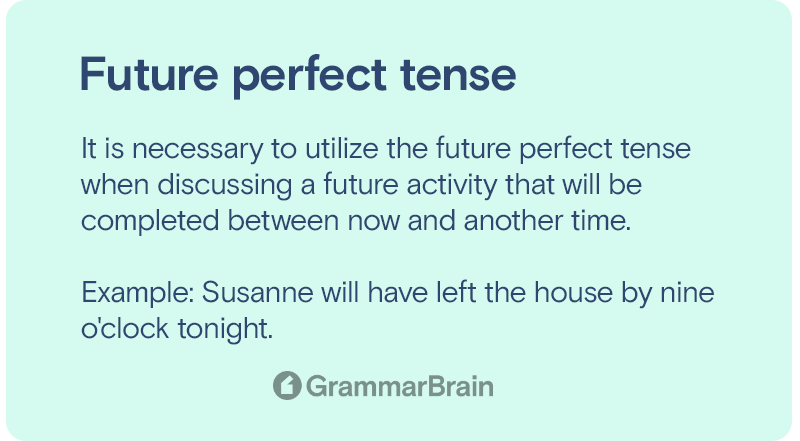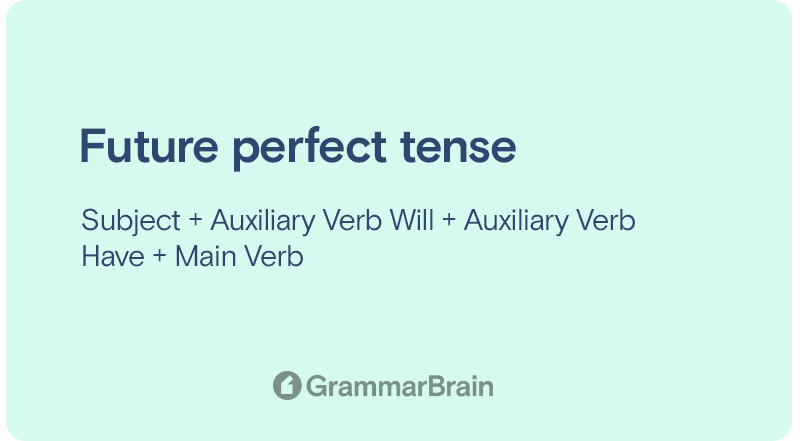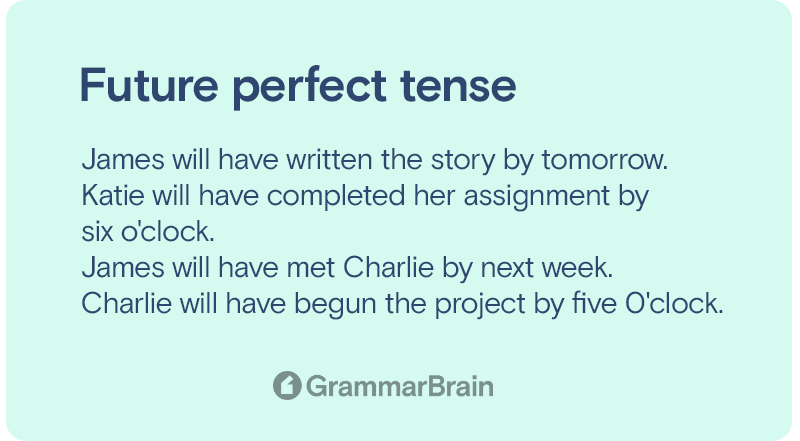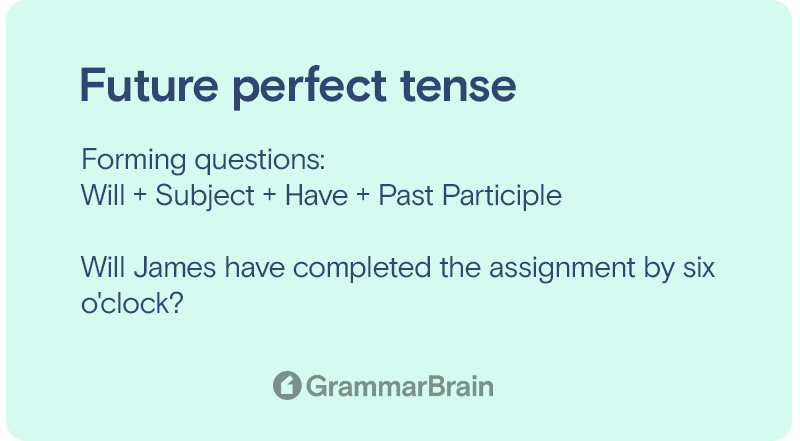What is future perfect tense? How does future perfect tense work? How are sentences formed in the future perfect tense? A verb is said to be in the future perfect tense when it refers to an activity. This activity will be finished before another time or place in the future.

What is future perfect tense?
It is necessary to utilize the future perfect tense when discussing a future activity that will be completed between now and another time.
Consequently, the true implication is that it discusses the current while looking back on the past. Let’s clarify this with the use of an example, shall we?
The future perfect tense is being utilized here to talk about Susanne. She is going to leave the home after the current time, but before the time that is being discussed, which is nine o’clock.
It is not nearly as challenging as it may appear at first glance. Additionally, the future perfect tense is used less frequently, but it is still vital to understand it.

The fundamental formula for constructing sentences in the future perfect
By following this approach, it will be much easier to create sentences in the future perfect tense:
The structure of this sentence is:
Subject + Auxiliary Verb Will + Auxiliary Verb Have + Main Verb
It makes no difference if the singular or plural form of the noun is used in your statement. The formula will not be altered.

Here are a few instances
- James will have written the story by tomorrow.
- Katie will have completed her assignment by six o’clock.
- James will have met Charlie by next week.
- Charlie will have begun the project by five 0’clock.
When is the future perfect tense appropriate to use?
There are several situations in which the simple future tense and the future perfect tense can be used interchangeably.
Because the word that comes before makes it apparent what comes first in this series of events, there is no significant change in meaning between these two sentences:
Example 1
- Charlie will eat before break begins.
- Charlie will have eaten before the break begins.
In contrast, if there are no prepositions that indicate the sequence of occurrences in a phrase, employ them differently.
For instance, if the sentence does not have “before” or “by the time,” then employ the future perfect to indicate what came before.
Example 2
- At seven o’clock James will eat. (This means that James will wait till seven o’clock to eat.)
- At seven o’clock James will have eaten. (This means James will eat before seven o’clock.)
When is it appropriate to avoid using the future perfect?
The only activities that may be expressed in the future perfect tense are those that will be finished before a certain time in the future.
In other words, there has to be a time limit for the activity that’s being referred to. If no time limit is provided, write in the future simple tense rather than the future perfect tense.
Correct sentence
- James will eat.
Incorrect sentence
- James will have eaten.
The cut-off time might be quite definite (such as seven o’clock), or it could be fairly open-ended (next month). It might even rely on when something else happens (after the show ends). It must take place at some point in the foreseeable future.
How can negative sentences using the future perfect tense constructed
Creating a building with a negative future perfect is really simple! Simply substitute the word “not” for “will have.”
One illustration is as follows:
- James will have not started the project before we get there next week.
- Charles will not have written the assignment before the deadline next week.
Alternatively use the contraction won’t in lieu of will not in some situations.
Take, for instance:
- Charles won’t have written the assignment before the deadline next week.

How should a question be formulated using the future perfect tense?
It is extremely straightforward to utilize future perfect tense to pose a question. Here is the simple way to go about doing it:
Will + Subject + Have + Past Participle
Example
- Will James have completed the assignment by six o’clock?
- Will Damon have eaten his food before the teacher arrives?
When using the future perfect tense, some important things to keep in mind
Understand that the future perfect tense may be made by following the past participle of the main verb with two auxiliary verbs. These are ‘will’ and ‘have’ since this is the only way to form this tense.
For instance:
Stefan will have reached his house by six o’clock tonight. He left earlier today.
The addition of the letter ‘d’ to the end of the verb results in the formation of the past participle form of the verb, as you are aware. Having said that, there are times when this is not the case.
When used as a past participle, irregular verbs require a different spelling pattern than the verb itself.
What is the difference between simple future tense and future perfect tense?
Both the future simple and the future perfect have certain similarities and have some distinct distinctions; this might lead to some confusion.
What is the most important distinction that can be made between the future simple tense and the future perfect tense?
The future simple tense is used most frequently when discussing the choices that have been made.
However, the future perfect tense is used to speculate on when an event will come to its natural conclusion.
When talking about the differences between these two sorts of tenses, the structures of each of them should be the first thing that you grasp about them.
When compared to the construction of the future simple, the structure of the future perfect is more sophisticated.
The basic outline of the future simple tense:
In order to construct sentences using this tense, it is common practice to prefix the subject of the sentence with the word “will,” followed by the base form of the primary verb.
Subject + Will + Base form of the main verb
Examples
1. James will bring the speaker.
2. Charles will paint the wall.
The basic elements of the future perfect tense
The use of the future perfect tense often involves the following pattern:
Subject + Will + Have + Past participle form of verb
Examples:
1. James will have brought the speaker.
2. Charles will have painted the wall.
After gaining an understanding of how to construct each of these two sorts of sentences, the next step is to learn their respective functions.
The differences between the simple future tense and the future perfect tense, along with their applications
1. Making choices and decisions
The future simple tense is utilized when we wish to talk about choices that we make for the future.
Example:
- Charles will not bring the speaker.
In this particular clause, we are discussing a choice that will take place at a later time.
- Charles will not have brought the speaker.
In this particular line, the process of deciding things is not being discussed.
2. Future events
Both of these tenses often represent acts that will take place in the future, yet they communicate distinct actions and occurrences.
Examples:
- Gloria will complete her makeup.
- Gloria will have completed her makeup.
- James will talk to Charlie.
- James will have talked to Charlie.
3. Actions finished and completed
When talking about what will happen in the future, employ the future perfect tense.
The propensity to speculate about the time at which activities and occurrences will be finished.
Example:
- By next month, James will have completed the dam project.
4. Sequence of occurrences
The future perfect tense can also serve as a comparison tense in some contexts.
This indicates that this tense is used to compare events and actions in order to forecast which one will come to a conclusion first.
Example:
- Charles will have finished the work by the time Julie arrives.
All verb tense forms and their grammar rules
| Tense | Function | Rule | Example |
| Present simple | Helps to describe habits, facts, actions, and truth that are not affected by time | Ist form of verb + s/es | He loves pizza. |
| Past simple | Helps to describe events that have happened in the past | IInd form of the verb | She wore a beautiful dress for the party. |
| Future simple | Helps to describe events that will happen in the future | Will/ shall + Ist form | He will go to New York tomorrow. |
| Present perfect | Helps to describe the relevance of past events in the present moment | Has/ have + IIIrd form of the verb | I have learned to ride a bike. |
| Past perfect | Helps to describe events that happened prior to other events in the past | Had + IIIrd form of the verb | She had finished the paper before leaving the hall. |
| Future perfect | Helps to describe events that will be completed between now and a specific point in the future | Will/ have + IIIrd form of the verb | She will have finished the book by tomorrow. |
| Present continuous | Helps to describe ongoing actions | Is/ am/ are + Ist form + ing | She is reading a book. |
| Past continuous | Helps to describe ongoing events of the past, mostly in relation to another event | Was/ were + Ist form + ing | He was driving to work when the accident happened. |
| Future continuous | Helps to describe future events that will/are expected to continue for a period of time | Will be + Ist form + ing | I will be going to meet my grandparents tomorrow. |
| Present perfect continuous | Helps to describe events that started in the past and will continue into the present | Has/ have been + Ist form + ing | She has been writing a book for the past one year. |
| Past perfect continuous | Helps to describe events that began, continued, and ended in the past | Had been + Ist form + ing | I had been working in this company for ten years when I got the promotion. |
| Future perfect continuous | Helps to describe events that began in the past but will continue until a point in the future | Will/ shall have been + Ist form + ing | I will have been doing business with her for one year. |
FAQs
1. What exactly is meant by the “future perfect tense”?
A verb is said to be in the future perfect tense when it refers to an activity that will be finished before some other point in the future.
2. What is a good illustration of the use of the future perfect tense?
By the time we go back to the house, Chestnut will have ruined all of the pillows.
3. What is the fundamental framework for constructing sentences in the future perfect tense?
The following is a fundamental framework that will facilitate the easy creation of phrases in the future perfect tense:
The constituent parts: Subject + Will + Have + Main Verb
Sources:
- Future continuous and future perfect
- Future Simple vs. Future Perfect
- The Future Perfect Tense
- What Is the Future Perfect Tense? (with Examples)
- Future perfect
- Future Perfect
- Future Perfect
Inside this article
Fact checked:
Content is rigorously reviewed by a team of qualified and experienced fact checkers. Fact checkers review articles for factual accuracy, relevance, and timeliness. Learn more.
Core lessons
Glossary
- Abstract Noun
- Accusative Case
- Anecdote
- Antonym
- Active Sentence
- Adverb
- Adjective
- Allegory
- Alliteration
- Adjective Clause
- Adjective Phrase
- Ampersand
- Anastrophe
- Adverbial Clause
- Appositive Phrase
- Clause
- Compound Adjective
- Complex Sentence
- Compound Words
- Compound Predicate
- Common Noun
- Comparative Adjective
- Comparative and Superlative
- Compound Noun
- Compound Subject
- Compound Sentence
- Copular Verb
- Collective Noun
- Colloquialism
- Conciseness
- Consonance
- Conditional
- Concrete Noun
- Conjunction
- Conjugation
- Conditional Sentence
- Comma Splice
- Correlative Conjunction
- Coordinating Conjunction
- Coordinate Adjective
- Cumulative Adjective
- Dative Case
- Determiner
- Declarative Sentence
- Declarative Statement
- Direct Object Pronoun
- Direct Object
- Diction
- Diphthong
- Dangling Modifier
- Demonstrative Pronoun
- Demonstrative Adjective
- Direct Characterization
- Definite Article
- Doublespeak
- False Dilemma Fallacy
- Future Perfect Progressive
- Future Simple
- Future Perfect Continuous
- Future Perfect
- First Conditional
- Irregular Adjective
- Irregular Verb
- Imperative Sentence
- Indefinite Article
- Intransitive Verb
- Introductory Phrase
- Indefinite Pronoun
- Indirect Characterization
- Interrogative Sentence
- Intensive Pronoun
- Inanimate Object
- Indefinite Tense
- Infinitive Phrase
- Interjection
- Intensifier
- Infinitive
- Indicative Mood
- Participle
- Parallelism
- Prepositional Phrase
- Past Simple Tense
- Past Continuous Tense
- Past Perfect Tense
- Past Progressive Tense
- Present Simple Tense
- Present Perfect Tense
- Personal Pronoun
- Personification
- Persuasive Writing
- Parallel Structure
- Phrasal Verb
- Predicate Adjective
- Predicate Nominative
- Phonetic Language
- Plural Noun
- Punctuation
- Punctuation Marks
- Preposition
- Preposition of Place
- Parts of Speech
- Possessive Adjective
- Possessive Determiner
- Possessive Case
- Possessive Noun
- Proper Adjective
- Proper Noun
- Present Participle
- Prefix
- Predicate



